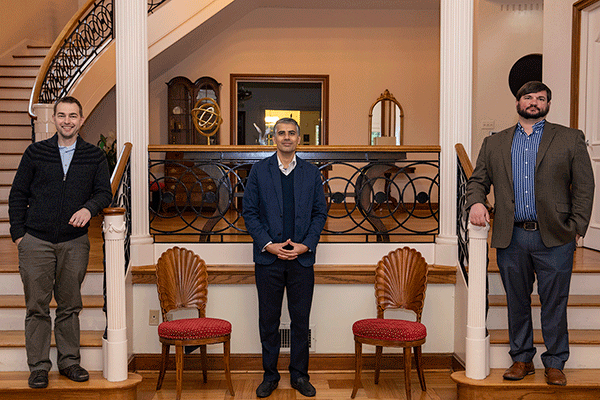Three University of Louisiana at Lafayette faculty members have each earned one of the National Science Foundation’s most prestigious awards.
Dr. Nicholas Kooyers, Dr. James Nelson and Dr. Mohsen Amini Salehi are recipients of the NSF’s CAREER Award. Presented by NSF’s Faculty Early Career Development Program, the honor recognizes individual faculty members whose institutions rank them as assistant, or entry-level, professors and acknowledges their strength as researchers and teachers.
Each of UL Lafayette’s honorees are faculty members in the Ray P. Authement College of Sciences. Dr. Azmy S. Ackleh is the college’s dean.
“This is one of the most prestigious funding awards early-career faculty can get. It shows the caliber of faculty we have in the College of Sciences. They are leaders in their respective disciplines and their ideas make them competitive at the national level,” Ackleh said.
Five College of Sciences faculty members are past CAREER Award recipients, but this is the first time multiple honors have come to the University in a single year, noted Dr. Ramesh Kolluru, associate provost and vice president for Research, Innovation and Economic Development.
Past recipients were Dr. Sheng Chen, a 2018 honoree; Dr. Danella Zhao, 2011; Dr. Miao Jin, 2009; Dr. Dmitri Perkins, 2005; and Dr. Hongyi Wu, 2004.
“With the addition of Drs. Kooyers, Nelson, and Salehi to this roster of exceptional academic talent, our faculty members have now received the CAREER Award eight times since 2004. That’s undeniable evidence of the continued strength of our research mission and the dedicated faculty whose work animates it,” Kolluru said.
Kooyers and Nelson are assistant professors in the Department of Biology. Salehi is an assistant professor in the School of Computing and Informatics. NSF grants accompany each award. Recipients will use the funding to further their research.
Kooyers will receive $997,269 over five years to examine whether assisted migration, a process where better adapted populations of a species are introduced into other populations of the species that are doing poorly, can help counter the effects of climate change on a model plant species.
“Current studies suggest that many species are now lagging behind changing climatic conditions and are doing poorly. Determining which species are impacted, how fast they are declining and evaluating potential solutions such as assisted migration could help preserve these affected plant species,” Kooyers said.
Nelson’s research on climate change’s effects on coastal marsh ecosystems will receive a $688,849 boost over five years as a result of his NSF CAREER Award.
“Louisiana is on the frontlines of climate change and has sustained decades of chronic and acute coastal trauma,” Nelson said. “The state’s rapidly changing coastal ecosystems provide ideal conditions for understanding how coastal change alters ecosystem function,” including the health of food webs that are vital to natural and human communities.
A $513,000, five-year grant accompanied Amini’s NSF CAREER Award. His research aims to enhance multimedia streaming beyond services such as YouTube and Netflix through developing a domain-specific cloud platform for multimedia streaming.
Such a platform “democratizes multimedia streaming and lays the foundation for the next generation of applications operating based on multimedia streaming,” Amini said. It will enable stream providers “to focus on developing advanced streaming services and integrate them” into the new generation of applications.
The NSF is an independent federal agency. It provides funds for nearly a quarter of all federally supported research American colleges and universities conduct. NSF first presented the CAREER Award in 1995.
Photo caption: From left, Dr. Nicholas Kooyers, Dr. Mohsen Amini Salehi and Dr. James Nelson are recipients of the National Science Foundation’s CAREER Award. Kooyers and Nelson are assistant professors in UL Lafayette’s Department of Biology. Salehi is an assistant professor in the School of Computing and Informatics. (Photo credit: Rachael Rafati / University of Louisiana at Lafayette)
